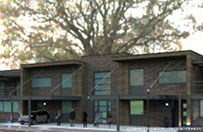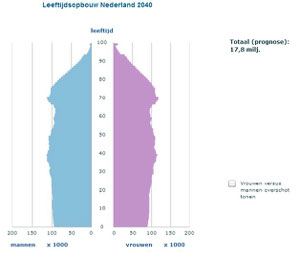





Business plan
with care facilities.
Comfortable and safe living on an estate

FOREWORD
Due to advances in healthcare and increasing use of advanced medical technology, people are living longer. Because people are living longer, there is an ever greater demand on the healthcare sector. The capacity of the care is not set for the growing demand for care. In about 15 years, the aging population in Western Europe will reach its summit and before that happens, far-reaching measures to face the capacity shortage in healthcare are necessary.
The increasing number of old people and the decreasing working population leads to an imbalance in healthcare in Western Europe. Demand exceeds supply which means that the present level of care cannot be guaranteed. The number of helping hands at the bed is increasingly becoming deficient. The care sector intends to solve this problem among other things by large-scale introduction of care domotics. With the help of care domotics (also called transmural care technology) people over 55 and people with somatic function limitations can remain longer, safer and more comfortably in their own houses and, if possible, go on holidays. CAS Woningen offers a care package based on the client’s needs and provided by different professionals from different disciplines and agreed by mutual consultation.
Since the inevitable grey tsunami is on a horrible arrival, architects and urban planners look at the American examples more often and more serious. Since the elderly Canadian snowbirds are spending the winter in the southwest desert of the U.S., settlements specifically created for the elderly housing consumer are built. Sun City in Arizona is the first and finest example of these seniors-cities and dates from 1960. The private enclave where you may only attend if you are at least 55 years old, has now grown into a city of 40,000 inhabitants. It is noteworthy that almost everything in Sun City is operated by the residents themselves, from the numerous businesses and the excessive offer of courses, to the sheriff’s duties.
This entrepreneurial spirit characterizes today's over-55s: they want to 'matter'. The time of the passive slobbering old man who is out of the picture is totally outdated.
The new elderly people is vital and enterprising, plays golf, plays with grandchildren and is proud of his knowledge and experience.
Management team CAS Woningen


Wat is het verschil met andere woonzorgconcepten?



CAS Woningen specialized itself in developing a varied and comfortable housing for different lifestyles, housing needs and service requirements.
Our service and care homes are offered in rental housing in which service and care are fully integrated.
We make the highest demands on the quality and appearance of our homes and represent professional and hospitable service.
Today, seniors are the future. Due to the increasing aging they take an significantly increasing important position in today's society and the demand for appropriate housing and care is rising.
The needs of current and future seniors are changing. More than ever, there’s a need for quality, diversity and individuality. Living with like-minded people in a safe and small-scale environment is a dream of many elderly. Living with the 24-hour presence of professional care and customized service. Housing is combined with the assurance of safe care and service in an exclusive environment. From this vision, CAS Woningen provides small and exclusive living/healthcare concepts.
People are living longer and staying healthy longer. Their expenditure structure is significantly higher than before. Seniors are very outspoken and critical when it comes to filling in their lives. They want to live in a safe environment where if required, service and care is available. Simultaneously, they want to preserve their freedom and continue enjoying life optimally. Keywords are independence, dignity and comfort. Preservation of identity, individuality and certainty about healthcare are essential.
CAS Care presents itself on the senior market as an owner and as a provider of innovative housing and healthcare. Innovative, because CAS Woningen uses the hospitable and client-oriented approach as a starting point. Summarized: housing, healthcare and service in a hospitable atmosphere.
CAS Care provides age-proof housing. Even if the physical and/or psychological condition change, usually the client can continue to live in the location and receive the required care.
Mission & Vision CAS Woningen
Vision
CAS Care provides a small, attractive, comfortable and exclusive environment for the elderly. And all of this in an atmosphere which respects your privacy, focus on a personal level and mutual contact like you were used to. You live in your own apartment in a common house where service and support is completely tailored to your personal wishes. With the assurance that safe care, which may be required, is permanently present and lies in the hands of professionals. You will be supported by CAS Care to ensure you can continue living your life as you want it. Do the things you find important and useful. CAS Woningen has a holistic vision on care. The basic principle is that every person is unique and needs its own pattern which in certain time and circumstances may vary.
The employees of CAS Woningen form the heart of the organization. They are experienced, friendly, honest and willing to change. The value of our staff as "source" of knowledge forms the basis for Human Resource Management.
Mission and vision of CAS Woningen in Practice
Mission
Core values of CAS Woningen are, openness, cooperation, quality, safety and security.
The questions of the client and his immediate environment are the basis for our professional behaviour. CAS Woningen wants to be leading in healthcare innovation and with this be progressive and ground breaking in its services and range of products. CAS Woningen aims to cooperate where possible and to work with (chain)partners to offer services and products. CAS Woningen wants to be the most client- and demand-driven, decisive and reliable provider of services in health and welfare related to independent living.
Comfortable, stylish living in a protected environment but still being able to participate in society and ,where necessary, use healthcare and customized services. To achieve this for our clients we ask a professional attitude of our employees, which is reflected by subject-oriented knowledge, the possession of a high degree of empathy and a natural sense of hospitality, efficiency and flexibility.

CAS Care builds sustainable, which means that buildings and other structures are developed and used with respect for people and the environment. But also, for example:
Use of sustainable materials which takes the environment and the health of residents and users into account;
A healthy indoor environment for example by good ventilation to prevent moisture, mold and accumulation of harmful substances; pleasant and liveable houses, buildings, neighbourhoods and cities;
Reuse and recycling of materials which are released during a construction project;
Responsible use of water;
By choosing responsible products to avoid depletion of raw materials for building materials.
Living at Estate Brekeld
The various possibilities of living on the estate.
Different forms of housing for the elderly in an area with plenty of privacy. Our intent is on small scale, with several small houses embedded in a varied countryside, which more likely has the atmosphere of a village rather than an institute. Our residents rent their own home, this means that we are guests there. CAS Woningen makes offers these living forms on the estate Brekeld:
Within CAS Care are four residential/care concepts. Customized for each background, lifestyle and care needs, CAS Woningen provides the right way of living. Each concept is unique and has some specific features that are useful for the (common) care needs.
Protected and small-scale housing with 24/7 psychogeriatric nursing home care. In comfortable residential units (without kitchen) from 35 m2. Maximum group size is 8 clients.
Small group housing form for people with somatic requests for help. Residential unit 55 m2 (without kitchen). Maximum residential group size is 6 persons.
Small-scale housing with comfort and support on demand services and care, 24 hours a day. In spacious and comfortable apartments of 60 m2, with luxury kitchen. Per cluster of 12 apartments gathered in one building there is a common area for meeting, watching TV and receiving guests for example celebrating a birthday.
Living like in a hotel by the combination of ambiance and (care)facilities and a high level of service. Services and care on request. In luxury and comfortable residential units from 70 m2 to 110 m2.
Brasserie, guests can cook for themselves if their apartment offers the possibility but they can also use the Brasserie for breakfast, lunch and dinner.
If guests of our clients want (or have to) stay for the night they can make use of bed and breakfast. Which is also located on the property. 12 spacious rooms, cosy and comfortably furnished with an own toilet and bathroom in every room equipped with (home automation) domotics. These rooms can also be used as emergency or intermediate care. Prior to or after hospitalization. Pending bridging care placed elsewhere or on location is one of the possibilities also.


Own house
A house with a private entrance and a private bathroom. You can furnish your home with your own belongings. As a resident, you can relax on your private veranda or balcony in the sun. In the garden you can walk to the greenhouse or through the woods. The site offers the space and the feeling of independence. Due to the enclosed nature of the terrain it is safe and secure and there always is someone around.
The village on the estate
Living on the estate, offers a variety of possibilities. You could call it a small village. In this village you can sit on a bench by the pond, have a coffee in the brasserie or help clean vegetables and baking cookies in the restaurant. In the studio you can enjoy the winter sun or participate in painting, pottery or follow a course in modern media. You can garden in the vegetable garden or the greenhouse, pick the eggs from the chickens, feed the sheeps or assist in cleaning the rabbit hutch.
Activities
With us, your own interests are in the centre of attention. What kind of music do you like, do you have affinity with cooking or do you prefer (listening)books or television/film? Our aim is to have no group activity program, but all staff, such as the people of the laundry, kitchen, and garden maintenance, have a task to involve the residents. We encourage residents to pop in to the laundry, the kitchen, the workshop, the massage and fitness room. Depending on the need, residents are able to participate in these specific activities.
Care and Services
The delivered care is based on an care plan fully agreed with you. There also are many services you can purchase based on usage.
You live independent as much as possible, which means you do what you can and what you want. If there is more needed, we can deliver home care, which is just as intensive as you need it to be.
Importantly, our idea is you do not need to move from Estate Brekeld to a nursing home. We can deliver this care.
We also try to make couples to live together as much as possible. This does not mean in all CASes they spend the whole day together. But this depends on the wishes, possibilities and the moments chosen to be together. For the vital partner it can sometimes be very enjoyable to just leave the care to us. Partners often use that time to maintain contacts with other residents (such as a visit to the service club, restaurant or golf course, etc.)



Developments
Of the total costs of care (90 billion in 2011), long-term care is the largest item. The costs for elderly care increased in 2011 by 4.7% to EUR 16.1 billion. The costs for disabled care amounted to EUR 8.3 billion, due to a capacity expansion. The costs of mental care increased most, namely by 11.8% to EUR 5.5 billion (including the cure part). The many recommendations written about the future of the AWBZ so far have not resulted in concrete measures to control the costs of long-term care. In the government agreement 2012, an additional EUR 1 billion has even been reserved for elderly and disabled care.
For mental care budget cuts are provided in combination with higher client’s contributions. Especially the demand for elderly care is strongly increasing.
In the next few years less care will be paid under the AWBZ (Exceptional Medical Expenses Act). A decrease of 25% is called realistic.
Financing of care will be income dependant. The Exceptional Medical Expenses Act (AWBZ) is transformed into a new national provision in which intramural elderly and disabled care (from ZZP 5) is nationally organized with a budget limit through the contract parameters.
The provision is given a ventrally policy, accompanied by care in kind as PCBs are part of this provision. The assessment and the care resulting from it will be limited to those who really need it.
Municipalities will be entirely responsible for supporting, supervising and care activities. Entitlements will be restricted, service will be retrenched and focused on real urgent need and will be governed by the Social Support Act (WMO).
Because of innovations, assertive patients and ageing, the cost of care will continue to increase in next few years. Innovation in health care continues and is urgently needed to increase productivity. It is expected that in 2025 there will be a shortage of 475,000 caregivers. Apart from that there is innovation in the area of domotics, radiology and self-testing for prevention and screening. New operation models will be developed to meet the strongly increasing demand for care. Task delegation for practitioners, more-chair concepts for dentists and the operation method of independent treatment centers will create more possibilities for treatment and nursing of patients.
Emphasis on innovation and new care concepts
The perspective for the healthcare sector is positive because of the increasing demand due to demographic developments: ageing, increase life expectancy and the altered perception of the quality of life. This growing demand for care leads to unsustainable funding. This means that the existing business model in healthcare is not sustainable. CAS Woningen responds by presenting an innovative business model with a new concept.
Life expectancy
One of the most remarkable demographic developments over the past decade
regards mortality. Despite the aging of the population the annual number of deaths between 2002 and 2007 decreased sharply, from 142,000 to 133,000 (graph
1). In the past few years this number rose again to around 139,000 in 2012. In the
years prior to 2002 the number of deaths showed, in conjunction with the aging,
a clear upward trend. Since 2002, this increase is compensated by an accelerated decrease in mortality chances. This decrease is also significantly at the highest ages.
De prognose van 2012 voorziet dat de levensverwachting van vrouwen stijgt tot 89,9
jaar in 2060 en die van mannen tot 87,1 jaar (grafiek 4). Voor vrouwen is dat 2,5 jaar en
voor mannen 2,6 jaar hoger dan volgens de prognose uit 2010.
Perspective
Trends and developments
Between 2011 and 2040, the number of 55-plus of the population will increase from 15.6% to 25.3%. This rapid ageing will result in a strongly increasing demand for specialist medical care. If the present trends continue, costs will double within a period of 20 years. For the coming years the minister assumes a maximum growth of 2.5% per year. Besides, she gives hospitals and health insurers more freedom to determine their own prices. On 1 January 2012 the performance funding was introduced. So as to be able to control cost development, the insurance package will have to be reduced and patients will have to pay more contribution. At the same time the hospitals will be under continuous pressure to work more efficiently. For ophthalmology , dermatology and orthopedics bigger, specialized centers will be built. Due to the removal of a portion of the risk equalization, care insurers will increasingly turn to selective care purchasing.
The care sector is facing major strategic issues. Choices have to be made concerning market, care product, size and image. Care insurers and the government focus on high quality care and specialization around disorders. To make the rights choices, care centers have to weigh different perspectives: the market and the competition, the efficiency, the available competences and ambitions and the accessibility of care. The free healthcare market offers good chances for entrepreneurs.
Patients increasingly decided on a particular hospital or specialist and are prepared to travel longer distances. This requires more choice information. Competition mainly takes place on quality, not on costs. The number of elderly and chronically ill people is increasing. Furthermore there is a shift from care to nursing and home care.
In the light of the increasing market forces there is a great need for professionalism of the present care providers and care managers (good governance).
Population pyramid The Netherlands in 2013 and 2040
The only reason we can not provide the care is when there is such as psychological and behavioral problems, danger or inconvenience is caused to other residents. The risk to this is very small. Such behaviour emerge in 1-5% of the CASes of dementia. If during the somatic care need our professional knowledge and experience fails, or when there is a need for specialized equipment, we search for a suitable solution together with the client.





Borculoseweg 113 | 7161 GV Neede






